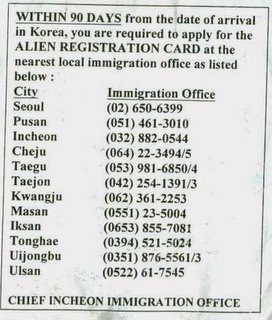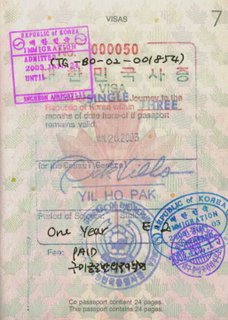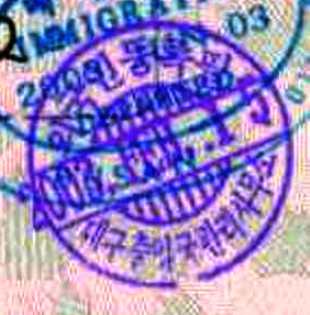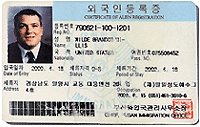This is a necessary procedure for any foreigner wishing to live and work in Korea legally. Also, it must be applied for at the nearest Immigration Office within 90 days of your arrival in Korea - if you arrive with a working Visa. In my case I had an E-2 [Conversational English Teacher] Visa. So, within 90 days of my arrival I had to go to Daegu [South Korea] about a 30 minute drive from Gumi [South Korea] to register at Immigration. In fact, when I got my Visa in Toronto, they paper clipped the following paper into my passport.

[Author's Note: On this paper Daegu is spelled Taegu. There is some confusion in Korea about the Romanization of Korean and therefore often D and T are interchanged as are B and P. Lastly, G and K can be used interchangable in place names. This leads to a lot of confusion cause some people say they live in KUMI and some people say they live in GUMI. It's the same place just spelled differently. Having gotten used to this I am try to be consistent about spelling place names I always spell Gumi with a G and Daegu with a D. However, I am not consistent is the spelling of Busan/Pusan. Sometimes I spell it will a B and sometimes I spell it with a P. Just want to you know it's the same place.]
***********************************
Below is my E-2 Visa. They have since changed it and made it a computerized paper that is pasted into your passport but this is what it looked like in January 2003 when I got it in Toronto, Ontario, Canada.

I know it's a little blurry and hard to read but above is a stamp on my E-2 [Conversational English Teacher Visa]. It says that the Daegu Immigration Bureau issued me a Wae-guk-in [Alien or direct translation is "foreigner"] card on February 15, 2003.
It's important to get an Alien Card for without it you usually can't do even the most necessary things like:
- Open a bank account
- Buy or set up cell phone service - not even Pre-paid or "Pay as you go" cell phone service
- Get internet hooked up
- Register at a hospital or clinic - this is not to say you can't get medical treatment cause you can but they always ask for your Alien [Wae-guk-in which actually means "Foreigner"] Card.
So, on Saturday, February 15th, 2003 Mr. Kim picked me up at my apartment and drove me to Daegu to get my Alien Card. I remember being excited to get this process over but unfortunately I didn't record about it in my diary so in writing about it I am relying on my memory. I know that I had to take my passport and my University Degree - the original degree - and I think Mr. Kim had some papers with him from the school like the school's business licence or at least the number of their business licence.
What I will never forget is that I was finger-printed. I didn't expect it. I had NEVER been finger-printed before in my life. And, all of a sudden I was being finger-printed! I was horrified! I felt like a criminal. Luckily, there were some other foreigners there going through the same process and so I was able to laugh and talk to them about it.
The worse part of the whole finger-printing process was afterward in when I was sent to the bathroom to try and wash up. There was no soap or paper towel in the bathroom and the water was ice cold. Trying to get the black ink off of my fingertips with icy cold water and no soap was useless!
I later learned that all Korean people get an ID card and that they are finger-printed for it. They even have a scanned thumb print on the back of their ID card. So, it being finger-printed was not some kind of a discrimination thing or some comment of the likelihood of my committing a future crime. It was just a standard procedure.
***********************************
There are some websites that tell more about getting an Alien Card in Korea. One of the best is at Dave's ESL Cafe. Here is the link. Unfortunately the download applications do not work and I was not able to find another place to find them but it does offer information and tells how the first time you go you will be fingerprinted [wish I had known that, ha, ha] and to take at least 3 small passport sized photos. I think I only had 2 one for the card and one for their files but maybe you need 3 now [better safe than sorry].
Alien Card InfoAnother website I found with all kinds of useful information about Korea is LifeinKorea. I have the link for it here.
Life In Korea
One of the best blogs I've read about Life in Korea is I Have Seoul. This is another Canadian English Teacher in Korea. Shaun has tons of useful links and information. His information is for Canadian and the map is for Seoul. To find the office nearest you ask someone at your school or call the numbers of the offices I have listed above. Someone in every office speaks some English. Or at least I have always found that to be the case.
Here's the link. I Have Seoul
I found a website with information of how to get the Daegu/Taegu Immigration Office. Here's the link. Daegu Specific Information

Above is a sample of what an Alien Registration Card looks like. I found it on a Korean Government website. So they don't get me for copyright violation here's the website I copy this image from. City of Daegu
I hope quoting my source is enough to mean I am not infringing on a copyright. I would have scanned in my Alien Card and blurred the personal info. but I have never had a scanner in Korea and I never took my Alien Card out of the country so I don't have any copies of it.
******************************
So I get my Alien Registration Card [ARC]. Having gotten this process out of the way I feel more established in Korea. Now I can open a bank account. Yippee!



Great info, thanks. I'll be coming out to Busan shortly and will need to suffer the indignity of being fingerprinted too!
ReplyDeleteI first noticed your blog last year and have been dropping by from time to time. Your writing is quite impressive. Is there any way I can get in touch with you?
ReplyDeleteWhat were the documents that you needed to get your alien registration card?
ReplyDeleteI needed my passport with a valid E-2 (Conversational English Teacher) Visa, and the first time I applied I needed to supply my fingerprints. Also, I needed to supply the orginal of my university degree and a photocopy of it that they officals could keep. And, three photos (passport sized).
ReplyDeleteThe school, also, had to provide some documents like my contract (in Korea) and the stamp (school uses a stamp rather than a signature) and probably some tax and/or incorporation documents from the office at the school.
Hope this helps.